
NewTek @ UTEP
The University of Texas at El Paso provides abundant opportunities for hands-on research. We are the country’s only doctoral research–intensive university with a student body that is predominately Mexican–American.
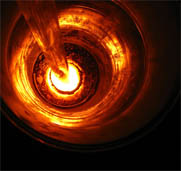
UTEP Engineers Receive Grant to Develop Hypersonic Materials
Mechanical Engineering Professors at The University of Texas at El Paso were awarded $350,000 by the Air Force Office of Scientific Research (AFOSR) to create materials that can withstand ultra high temperatures and hypersonic speeds.
“It’s based on the speed of sound,” said Dr. Art Bronson. “Hypersonic would be ten times greater than the speed of sound, or hypersonic is 100 times 75 miles per hour.
Bronson is working with Dr. Jack Chessa, an expert on computational mechanics, to develop a computational design of ceramic composites for use at temperatures above 3000 degrees Farenheit. These materials could be used to create hypersonic vehicles, for space shuttle re-entry, or on other objects exposed to high temperatures. [more]
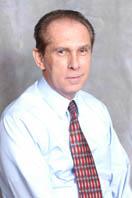
UTEP Professor to Create an Electricity Generating Device Using Explosives
Dr. Lawrence Murr, Chair of the Department of Metallurgical and Materials Engineering at The University of Texas at El Paso has received a grant to create thermoelectric materials using explosives.
The project, titled “Phase I STTR: Shockwave Fabrication of High Performance Thermoelectrics” received funding from TXL Group, Inc., a local company that manufactures thermoelectric materials and devices, converting wasted heat to electricity. Since current solar materials are not 100% effective when converting heat to electricity, much of the heat produced is wasted.
TXL Group, Inc. hopes that Dr. Murr’s research, which uses explosives to create the materials, will enhance the materials’ efficiency. [more]
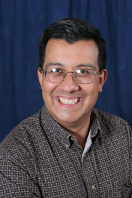
Radar Research Can Track High Speed Targets, Missiles
UTEP Engineering Professor Dr. Benjamin Flores is performing cutting edge research that promises to make the country a safer place.
For more than a decade, Flores has done extensive research on radar. Funded by the Department of Defense and the Office of Naval Research, his research has led him to develop new radar signal processing approaches to obtain images of targets such as military aircraft or even intercontinental, ballistic missiles coming in through the atmosphere at high speeds.
The speeds at which these objects travel challenge current radar technology. Flores’ research involves the use of microwaves to get a clear, focused picture of airborne targets. It can easily tell the difference between friend and foe and provides numerous other details such as size, shape and even the type of propulsion engines. [more]
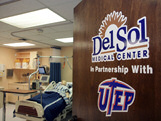
School of Nursing Opens Simulation Center at Del Sol
The UTEP School of Nursing, in conjunction with Del Sol Medical Center, recently held a grand opening ceremony for a new simulation center.
Del Sol is providing UTEP with space and equipment for the simulation center to help train nursing students.
"It provides students with reality-based scenarios so they can practice before they take care of real patients," said Cindy Stout, Chief Nursing Officer at Del Sol.
The simulation center is part of Del Sol's ongoing support of UTEP. Some recent grants include $100,000 from St. David’s HealthCare of Austin, a division of the Hospital Corporation of America (HCA) Inc., Del Sol's parent company. The grant was established to provide funds for 25 practicing nurses from Mexico to prepare for the Texas NCLEX Exam, the state's nursing board licensure. Del Sol also funded two full-time nursing instructors for UTEP, allowing the University to enroll more students into the nursing programs. This in turn addresses ongoing nursing shortages in the Paso del Norte community. diabetes. [more]
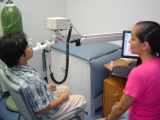
Research to Improve Chronic Healthcare
A laboratory at The University of Texas at El Paso is leading the nation in improving respiratory healthcare.
The Pervasive Health Technology Laboratory in the College of Engineering at UTEP is developing new technologies to provide pervasive healthcare to patients suffering from chronic conditions. The new technology will enable healthcare providers to pervasively monitor, examine, and treat patients suffering from asthma, COPD, congestive heart failure, sleep disorders, and diabetes. [more]
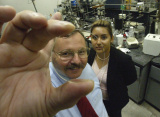
Science Professor’s Light Filter Saving Works of Art
A UTEP chemistry professor played a major role in a “revolutionary” research project that could enhance the way paintings are seen while at the same time protect them from the harmful rays that slowly, but surely, destroy them.
Carl. W. Dirk collaborated with the Getty Conservation Institute and The Georgia O’Keeffe Museum in Santa Fe, among others, to come up with the special light filter that can reduce the harmful light rays by 35 to 57 percent. [more]
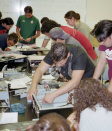
UTEP Students Build Supercomputer, Create Pipeline
The University of Texas at El Paso has received an additional $650,000 from the National Science Foundation for a project to boost minority preparedness in High Performance Computing.
The first award received in 2003 in the amount of $750,000 was used to create the Virgo cluster high-performance computer in the newly created Distributed Computing Lab (DCL) at UTEP. The second award will allow UTEP researchers to build on the research initiatives from the first award. [more]

Critical Cranial Defect Research
The College of Engineering at The University of Texas at El Paso has been awarded more than $300,000 to research materials and methods to repair critical cranial defects.
According to Dr. Malcolm Cooke, Mechanical Engineering Professor and Principal Investigator for the project, cranial defects are more common than most people realize. Cranial defects can be the result of bone loss due to the removal of tumors, skeletal trauma, or even congenital deformity. Currently these defects are repaired using inert materials that can’t integrate with and remodel the host bone. [more]

UTEP's ELEMENTS Classroom
Fostering and supporting teamwork and innovation was the main goal of a new collaborative classroom designed and developed by ISS staff. This room (located in UGLC 338) titled ELEMENTS, creates a blended space which melds state of the art technology- enabled collaborations with a physical space that can be shaped to meet the users needs and goals. We envision cross-disciplinary teams sharing workspaces to create innovative projects and undergraduate/graduate teams collaborating to solve problems using technologies in a physical space that enables a high degree of collaborative achievement. [more]
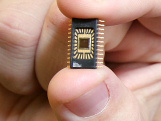
UTEP's first Million-transistor Chip
Researchers at the University of Texas at El Paso in collaboration with a local engineering company (XL-Synergy, LLC) have created a one million transistor chip the size of a pencil eraser.
The chip mathematically detects problems in the power of household appliances in order to improve safety and prevent fault-induced fires. [more]
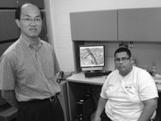
Transportation Lab Dreams BIG
The BIG Transportation Lab is not necessarily the biggest among UTEP's many research labs, but the projects taking place there have significant meaning to local commuters and people who frequently cross the U.S.-Mexico border.
BIG stands for Border Intermodal Gateway, which was established in 2006 under the Department of Civil Engineering to conduct research related to transportation on the border, including planning, traffic simulation, traffic operations and management and intelligent systems. [more]
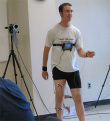
Learning to Walk Again
Adults and children who suffer with a walking disability as a result of a neurological problem such as multiple sclerosis, stroke, traumatic brain injury, or spinal cord injury, will soon benefit from research being done at The University of Texas at El Paso.
Developed by Dr. Thompson Sarkodie-Gyan, an electrical engineering professor at UTEP, the Smartgait Rehabiliation System is a new technology designed to help neurologists better identify impairments in patients with walking disabilities. [more]


